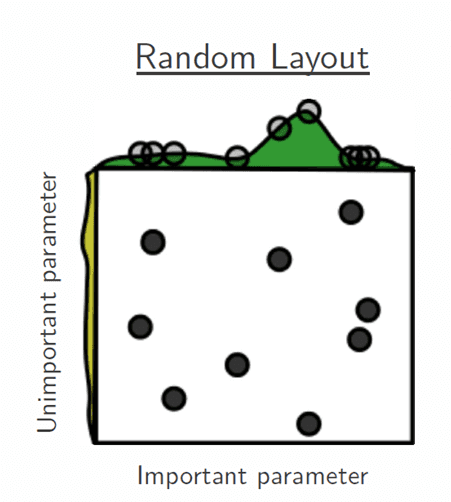
V1RandomSearch
polyaxon._flow.matrix.random_search.V1RandomSearch()Random search creates a number of unique experiments by sampling randomly from a search space. Random search is a competitive method for black-box parameter tuning in machine learning.
Random search requires a parameter numRuns,
this is essential because Polyaxon needs to know how many experiments to sample.
- Args:
- kind: str, should be equal
grid - params: List[Dict[str, params]]
- concurrency: int, optional
- num_runs: int, optional
- seed: int, optional
- early_stopping: List[EarlyStopping], optional
- kind: str, should be equal
YAML usage
matrix:
kind: random
concurrency:
params:
numRuns:
seed:
earlyStopping:Python usage
from polyaxon.schemas import (
V1RandomSearch, V1HpLogSpace, V1HpUniform, V1FailureEarlyStopping, V1MetricEarlyStopping
)
matrix = V1RandomSearch(
num_runs=20,
concurrency=2,
seed=23,
params={"param1": V1HpLogSpace(...), "param2": V1HpUniform(...), ... },
early_stopping=[V1FailureEarlyStopping(...), V1MetricEarlyStopping(...)]
)Fields
kind
The kind signals to the CLI, client, and other tools that this matrix is a random search.
If you are using the python client to create the mapping, this field is not required and is set by default.
matrix:
kind: randomconcurrency
An optional value to set the number of concurrent operations.
This value only makes sense if less or equal to the total number of possible runs.
matrix:
kind: random
concurrency: 2For more details about concurrency management, please check the concurrency section.
params
A dictionary of key -> value generator
to generate the parameters.
To learn about all possible params generators.
The parameters generated will be validated against the component’s inputs/outputs definition to check that the values can be passed and have valid types.
matrix:
kind: random
params:
param1:
kind: ...
value: ...
param2:
kind: ...
value: ...numRuns
Maximum number of runs to start based on the search space defined.
matrix:
kind: random
numRuns: 5seed
Since this algorithm uses random generators, if you want to control the seed for the random generator, you can pass a seed.
matrix:
kind: random
seed: 523earlyStopping
A list of early stopping conditions to check for terminating all operations managed by the pipeline. If one of the early stopping conditions is met, a signal will be sent to terminate all running and pending operations.
matrix:
kind: random
earlyStopping: ...For more details please check the early stopping section.
Example
In this example the random search algorithm will try 20 unique experiments based on the search space defined in the params subsection.
version: 1.1
kind: operation
matrix:
kind: random
concurrency: 10
numRuns: 20
params:
lr:
kind: logspace
value: 0.01:0.1:5
dropout:
kind: choice
value: [0.2, 0.5]
activation:
kind: pchoice
value: [[elu, 0.1], [relu, 0.2], [sigmoid, 0.7]]
early_stopping:
- metric: accuracy
value: 0.9
optimization: maximize
- metric: loss
value: 0.05
optimization: minimize
component:
inputs:
- name: batch_size
type: int
isOptional: true
value: 128
- name: lr
type: float
- name: dropout
type: float
- name: activation
type: str
container:
image: image:latest
command: [python3, train.py]
args: [
"--batch-size={{ batch_size }}",
"--lr={{ lr }}",
"--dropout={{ dropout }}",
"--activation={{ activation }}"
]